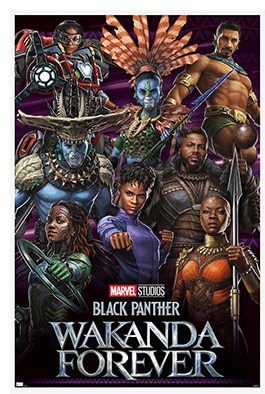Movies bring people of all backgrounds together like few other events. We want to provide talking points to help you take conversations about movies with family and friends to a deeper, spiritual level. Starting from this common ground, you can find opportunities to share your own faith experience with others. Check out the discussion questions at the end.
Black Panther: Wakanda Forever
PG-13 • 2022 • Action/Adventure • 2 hours 41 minutes
Starring: Letitia Wright, Lupita Nyong’o, Danai Gurira, Tenoch Huerta
——–
By Andrew Wood
It’s been two years since Black Panther fans were stunned by the sudden loss of lead actor Chadwick Boseman to cancer. Black Panther: Wakanda Forever is an extended tribute to his character, King T’Challa, and a passing of the torch to a new generation as the kingdom of Wakanda faces unprecedented global threats. In the process, the audience is challenged to reflect on issues of grief, generational change, and the rise and decline of global powers.
THE BACKSTORY
In the previous film, Marvel’s Black Panther (2018), Wakanda appears to the world to be an ordinary, developing African nation. In reality, it sits on a rare resource called “vibranium” which it has used to develop highly advanced technology and cloak itself from the world. After his father’s death, Prince T’Challa (Boseman) struggles for the throne with Killmonger (Michael B. Jordan), who plans to use Wakanda’s technology to incite a global revolution. T’Challa comes out on top, but not before the world discovers Wakanda’s true abilities and their source.

NECESSARY MOURNING
In this new installment of the Black Panther franchise, T’Challa succumbs to an undisclosed illness before his scientist-sister Shuri (Letitia Wright) can devise a cure. The whole kingdom joins her and Queen Ramonda (Angela Bassett) in an elaborate mourning ritual combining African cultural elements with futuristic technologies.
Grieving the loss of a loved one is a universal experience that connects moviegoers with the film’s protagonists. More than that, the funeral sequence feels like something fans themselves needed to mark the passing not just of a fictional character, but of the deeply beloved actor who played the role.
WAKANDA ON THE DEFENSIVE
Without T’Challa’s leadership, Wakanda faces huge international threats. The United States, France, and other world powers demand that Wakanda share vibranium with the rest of the world and are determined to get it, whether by force or by exploration for new sources. Queen Ramonda refuses to share vibranium, fearing it will be used for destructive purposes.
Traditional world powers are not Wakanda’s only threat, however. American deep-sea exploration disturbs another well-hidden kingdom built upon an undersea source of vibranium. This aquatic, Mesoamerican-based culture Talokan is led by a fiercely protective mutant warrior named Namor. With vibranium’s secret out, Namor is determined that neither Wakanda nor any other nation will be a threat to his people.
TOUGH, REAL ISSUES
A key achievement of the Black Panther franchise is its ability to tackle some of the most controversial issues of our time in ways that can reach all audiences. Its fantasy genre allows us to see issues from another perspective in a way we might miss in the real world.
For example, in Wakanda, women are completely equal to men and serve in leadership positions in government, the military, and technology. It’s not remarked upon, but simply shown as a fact of their society. Men might clash with female leaders on policy issues, but never on the basis of gender.
Wakanda Forever has an even stronger anti-colonial theme running through it than the first movie. World powers are assumed to be rapacious and untrustworthy, and their concerns about Wakanda monopolizing a world-changing (or world-destroying) technology are dismissed. Namor of Talokan is less a villain than an anti-hero. With his people’s back story of having survived Spanish conquistadors, he becomes such a sympathetic character, at times it’s hard not to root for him in battle scenes.
WHAT DOES IT SAY ABOUT US?
Comic books and the films based upon them often draw from current cultural themes. Thus, they can be a barometer of how the secular culture views certain issues. Seen in this way, Black Panther: Wakanda Forever is a reflection on the passing of national leadership to a new generation of leaders, and international leadership to developing nations.
No doubt about it, the movie leaves us with some anxiety about what is to come in a world of rapid and radical change. But it also leaves us with hope that younger people will be able to combine the best of the past with the discoveries of the future, as the kingdom of Wakanda itself does.
_ _ _
If you’d like to take your discussion of this movie with others to a deeper level, try some of these questions:
- How has your life been touched by grief, and what helped you start to heal from it?
- In the real world, which countries do you think are declining in influence, and which are growing? How could this affect us and future generations in positive and not-so-positive ways?
- Are there areas of society where gender distinctions should be maintained, or should we try to erase distinctions? Explain.
- Movies of the past often had clear villains and heroes. In today’s movies, those distinctions are not always so clear. Why do you think that is, and what does that say about the time in which we live?
- What gives you hope for the future even when it seems clear it will be very different from the past?
Andrew Wood, a former missionary to Ukraine and professor at Nebraska Christian College, is a freelance writer.

Like to see articles of good Christian service among Church of Christ (non instrumental) congregations or ministries that in the long run will promote unity.